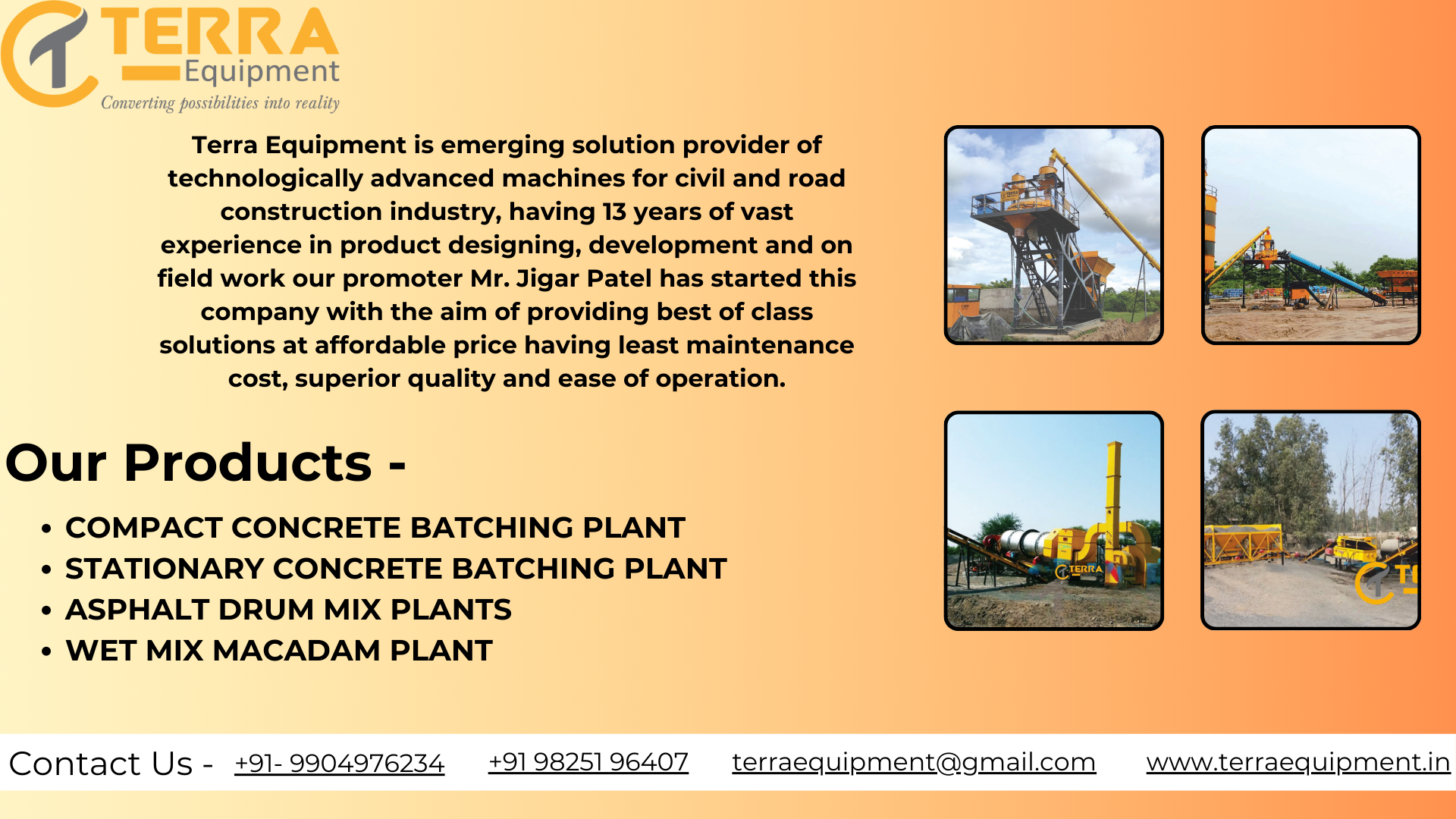Concrete Batching Plant
What Is a Concrete Batching Plant?
A Concrete Batching Plant is a mechanical facility used to combine various ingredients such as cement, water, sand, aggregates, and additives to produce concrete. It ensures uniform mixing, accurate proportioning, and consistency of concrete batches — essential for construction, infrastructure, and precast industries.
Concrete batching plants are available in stationary and mobile (portable) types, depending on the project scale and location requirements.
Concrete Batching Plant Price in India
Plant Type |
Capacity |
Approx. Price Range (INR) |
|---|---|---|
| Mini Batching Plant | ?10 – ?18 lakh | |
| Mobile Plant | 20–60 m³/hr | ?15 – ?30 lakh |
| Stationary Plant | 30–90 m³/hr | ?25 – ?65 lakh |
| High-Capacity Plant | 120 m³/hr and above | ?70 lakh – ?1.5 crore |
| Fully Automatic with SCADA | Any capacity |
How It’s Made – Manufacturing Process
A concrete batching plant is a complex system made through modular engineering and industrial-grade fabrication.
1. Design & Engineering
-
Custom layouts based on capacity and site.
-
Structural drawings for bins, conveyors, silos, and control panels.
2. Fabrication of Major Units
-
Aggregate Bins & Weighing System: For storing and weighing sand, gravel, etc.
-
Cement Silo: Stores cement in bulk; fitted with level indicators and vibrators.
-
Water Dosing Unit: Measures water by weight or volume.
-
Mixing Unit: Planetary or twin-shaft mixer for uniform blending.
-
Control Panel: Manual, semi-automatic, or fully automatic PLC with SCADA.
3. Assembly
-
Frames, conveyors, motors, and mixers are installed on the site or at the factory (for mobile units).
-
Integration of load cells, sensors, and electricals.
4. Testing & Calibration
-
All components are calibrated to ensure accurate batching.
-
Control logic is tested for operational safety and cycle timing.
Where It’s Used
-
Building Construction: Residential, commercial, and industrial structures
-
Infrastructure Projects: Roads, highways, bridges, flyovers, tunnels
-
Railway & Metro Projects: Precast sleepers, platforms, etc.
-
Precast Industry: Beams, columns, pavers, boundary walls
-
Ports & Dams: Mass concrete works and retaining structures
Key Features of Concrete Batching Plants
-
Accurate Weighing of Raw Materials (via load cells)
-
Uniform Mixing in Less Time
-
Automatic or Manual Control Options
-
Dust Collection System for Clean Operation
Easy Maintenance with Modular Design
-
Mobile or Stationary Setup Available
-
Optional Admixture Dosing Systems
Importance of Batching Plants in Construction
-
Enables consistent concrete quality for structural reliability
-
Saves time and increases productivity on-site
-
Ensures IS code compliance for commercial and government projects
-
Helps in large-scale construction by supplying concrete continuously
Advantages of Using a Concrete Batching Plant
Accuracy: Ensures correct ratios of cement, aggregates, and water
Efficiency: High-speed production with minimal wastage
Automation: PLC/SCADA reduces reliance on operators
Versatility: Can produce different concrete grades (M15–M50+)
Portability: Mobile units can be shifted between projects
Environmental Control: Dust suppression and recycling options
Quality Control: Real-time monitoring of mix and batch history
Cost Saving: Reduces cement and material overuse through precision
Significance of Concrete Batching Plants in India's Growth
-
India’s infrastructure push under smart cities, highways, and housing schemes has created a strong demand.
-
Ready-mix and precast concrete are now standard in urban and industrial projects.
-
Government mandates on quality certifications (RMCMA, ISO) drive usage of batch plants.
-
Faster urbanization and mega-projects (metro, airports, ports) require continuous and high-volume concrete supply.
Why Choose a Quality Concrete Batching Plant?
-
Precision in Construction: Avoids under-strength or over-watered concrete
-
Long-Term Asset: Offers durability and return on investment for builders
-
Custom Options: Capacity, automation, and silo arrangements per project need
-
Support & Service: Indian manufacturers offer quick service, spare parts, and AMC
-
Enhances Brand Image: Especially important for real estate and government contractors
-
Eco-Friendly Options: Water recycling and low-dust operation available
FAQs – Frequently Asked Questions
1. What capacity should I choose for my project?
-
For small buildings: 15–30 m³/hr
-
For housing societies or commercial: 30–60 m³/hr
-
For infrastructure and RMC: 90 m³/hr and above
2. How is the concrete quality ensured?
-
Load cells, automatic batching, and mixing timers ensure accurate proportions.
-
SCADA systems offer real-time monitoring and history logs.
3. Can I install a batching plant on a rental basis?
Yes, many project-based installations are done on lease or rent-to-buy models.
4. What is the difference between mobile and stationary batching plants?
-
Mobile: Easy to relocate, compact, ideal for short-term projects
-
Stationary: Fixed installation, higher output, better suited for long-term or high-volume projects
5. Are these machines eco-friendly?
6. How long does it take to install a batching plant?
-
Mobile: 2–4 days
-
Stationary: 1–2 weeks (depending on foundation and setup)
Conclusion
A Concrete Batching Plant is a critical component of modern construction — ensuring speed, quality, safety, and scalability of concrete supply. From highways to high-rises, batching plants help builders meet deadlines while maintaining structural integrity.
With India’s rapid infrastructure growth and urbanization, owning or leasing a batching plant has become a strategic necessity for builders, contractors, and developers. Whether you choose a mini plant for small projects or a fully automatic system for industrial scale, investing in a batching plant is a step toward precision, productivity, and profitability.
Contact:-+91-9825196407 , +91-9825196407
Gmail:-terraequipment@gmail.com
Website:-https://terraequipment.in/

